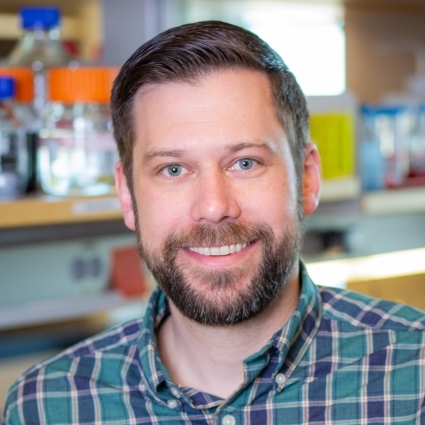FACULTY
HMGGP Training Faculty
Search
Filter results by:
Cheryl Ackert-Bicknell PhD
Professor
Completed Mentor Training Course
Research Focus:
Gene Regulation
Osteogenesis/Osteoporosis
We focus on the genetic regulation of bone mass and the genetic causes of bone disease from the point of view of bone formation and strength. We use both forward and reverse genetics studies to interrogate the genetic causes of phenotypes critical to understanding bone quality that cannot be readily studied in human populations. These phenotypes of interest include bone composition, bone formation and mineralization by the osteoblast. In addition, we participate in many human cohort studies aimed at understanding the etiology of musculoskeletal disease wherein we determine the biological function of genes found to be associated with musculoskeletal traits. Lastly, we study the diagnosis of and the consequences of postoperative infection, with an emphasis on an infection associated with spinal instrumentation.
Email:[email protected]
Emily Bates PhD
(She/Her/Hers)
Associate Professor
Completed Mentor Training Course
Research Focus:
Accepting Students
Developmental Biology
Developmental Neuroscience
Disease and Developmental Disorders
Fly Research Group
Genomics Bioinformatics
Glia
Neuropharmacology
We study how ion channel activity (bioelectricity) contributes to morphological development in multiple tissues (craniofacial structures, fly wings, brain, pancreas, and bone).
Email:[email protected]
Ganna Bilousova PhD
Associate Professor
Completed Mentor Training Course
Research Focus:
Aging
Other Systems
Stem Cells
My laboratory has a long-standing interest in induced pluripotent stem cells (iPSCs) and their differentiation capacity into a variety of cell types. I am particularly interested in developing experimental stem cell-based therapies for skin blistering diseases, such as Epidermolysis Bullosa, and connective tissue diseases, such as Ehlers-Danlos Syndrome. My group also studies mechanisms of aging and the pathways that trigger rejuvenation during reprogramming into iPSCs.
Email:[email protected]
Martin Breuss PhD
(He/Him)
Assistant Professor
Completed Mentor Training Course; Completed Maximizing Mentoring; Completed HEAL Foundations in Equity Certificate; Completed Raising a Resilient Scientist Training; Completed Implicit Bias Training; Completed Bystander/Upstander Training
Research Focus:
Accepting Students
Development
Genomics Bioinformatics
Neuro Genetics
Neurodevelopment
Reproductive Biology
The Breuss laboratory is interested in genomic (and cellular) mosaicism. We assess its impact on human disease and utilize it as a tool to unravel mechanisms of development and cellular homeostasis. While we are broadly interested in these questions, two of our favorite systems to study are human germ cells and the brain.
Email:[email protected]
Alexa Burger PhD
Associate Professor
Completed Mentor Training Course
Research Focus:
Accepting Students
Development
Developmental Biology
Developmental Disorders
Gene Regulation
Model Organisms
Mouse Models
Rare Diseases
Zebrafish Models
I have a long-standing interest in advancing genetic tools for model organism research that aid in studying mechanisms of vertebrate development and human disease. In my lab, we use the zebrafish (Danio rerio) as principal model, supplemented by work in chicken and mouse to further strengthen our findings’ link to human physiology, and to investigate the genetic and mechanistic causes of congenital diseases affecting mesodermal organ systems. We have developed methods for disease modeling in zebrafish using genome editing and transgenic approaches. We further use transgenic approaches to define cis-regulatory elements of tissue-specific genes to identify their involvement in vertebrate development as well as congenital diseases.
Email:[email protected]
Katrina Claw PhD
Assistant Professor
Research Focus:
Accepting Students
Computational Biology and Personalized Medicine
Genomics Bioinformatics
Molecular Nutrition & Metabolic Systems
My research focuses broadly on personalizing medicine, using genetic information and biomarkers for tailored treatment, in relation to pharmacogenomics as well as understanding the ethical, cultural, and social implications of genomic research with populations historically underrepresented in health research. My current research includes studying cytochrome P450 genetic variation in Indigenous communities (e.g., American Indian and Alaska Native peoples), with a focus on CYP2A6 variation in relation to nicotine metabolism and smoking cessation, as well as understanding the ways in which adaptations to diverse local environments may have impacted modern pharmacogenomic variation and evolutionary medicine. My other projects include exploring the perspectives of tribal members on genetic research with tribes and developing guidelines and policies in partnership with tribes. All of my projects strive to use community based participatory research approach and include cultural and Indigenous knowledge.
Email:[email protected]
David Clouthier PhD
Professor
Completed Upstander/Bystander Training; Completed Mentor Training Course
Research Focus:
Development
Neural crest cells (NCCs) arise at the junction between the neural and non-neural ectoderm before moving ventrally around the embryo along the entire rostro-caudal axis. Cranial NCCs form most of the bone and cartilage in the face, explaining why defects in early NCC patterning are so devastating to human facial development. Our lab uses a number of cutting edge molecular and cellular techniques and approaches in both mouse and zebrafish models to dissect signaling networks that decide the fate of NCCs. We then use this information to better understand the basis for human birth defect syndromes affecting the face for which a genetic basis has not been established.
Email:[email protected]
Joanne Cole PhD
(She/Hers)
Assistant Professor
Completed Upstander/Bystander Training; Completed Multicultural Mentoring; Completed Mentorship Academy Trainings
Research Focus:
Accepting Students
Bioinformatics
Computational Biology
Computational Biology and Personalized Medicine
Diabetes
Endocrinology
Epidemiology
Gene Regulation
Genomics Bioinformatics
Molecular Nutrition & Metabolic Systems
Sensory Systems
The Cole Lab uses large-scale genomics as a tool to learn more about diet's role in the body and human health, with a focus on cardiometabolic disease. Our three primary and related goals are to: 1) improve dietary phenotypes derived from diet questionnaires, 2) elucidate the underlying environmental and biological mechanisms influencing dietary intake and food metabolism, and 3) understand diet's role in human health through epidemiological approaches and human studies.
Email:[email protected]
Curtis Coughlin II PhD
Associate Professor
Research Focus:
Inborn Errors of Metabolism
Rare Diseases
We are a translational research lab focusing on inborn errors of metabolism such as pyridoxine-dependent epilepsy (PDE), glutaric aciduria type I (GA I), and vitamin B6 metabolism. We are committed to scientist - advocate collaborations with the goal to ensure scientific advances are relevant and patient-centered. We partner with families, clinicians, and scientists to study the natural history of these neurologic disorders and the impact of therapies on clinical outcomes.
Email:[email protected]
Alberto Cruz Martin PhD
Associate Professor
Research Focus:
Accepting Students
Cell and Molecular Neuroscience
Cell Biology
Cellular Physiology
Computational Neuroscience
Developmental Neuroscience
Disease and Developmental Disorders
Neuroimmunology
Synaptic Physiology
Synaptic Signaling and Plasticity
The Cruz-Martín Neural Circuits Lab investigates how immune pathways shape brain wiring, plasticity, and vulnerability to psychiatric disorders. Leveraging cutting-edge tools—from in vivo two-photon calcium imaging and STED super-resolution microscopy to spatial transcriptomics and cell-type–resolved transcriptomic mapping—we probe how complement-mediated signaling modulates interneuron connectivity and circuit function. We further examine how environmental perturbations like early-life stress intersect with genetic and neuroimmune susceptibility in schizophrenia. Our integrative, multi-scale approach illuminates the cellular and molecular mechanisms underlying brain disorders and may pave the way for more precise circuit-based interventions.
Email:[email protected]
Harriet Dashnow PhD
(She/Her)
Assistant Professor
Completed Mentor Training Course; Completed Upstander/Bystander Training
Research Focus:
Accepting Students
Bioinformatics
Computational Biology
Computational Biology and Personalized Medicine
Developmental Disorders
Epilepsy
Genetics
Genomics
Genomics Bioinformatics
Motor and Cognitive Disorders
We develop and apply computational methods for the diagnosis and discovery of the genetic basis of rare diseases. The lab has a special emphasis on Short Tandem Repeats and other hard-to-genotype variants.
Email:[email protected]
Natalie Davidson PhD
(She/Her)
Assistant Professor
Completed Mentor Training Course
Research Focus:
Accepting Students
Machine Learning
ovarian cancer
Our lab is driven by three core pillars: cutting-edge methods development, deep exploration of ovarian cancer biology, and a commitment to real-world translational impact. While machine learning has transformed our many aspects of our lives, applying it to ovarian cancer—an uncommon and highly heterogeneous disease—presents unique challenges. Our lab builds and applies advanced computational methods to make the most of available data, integrating diverse, high-throughput sequencing datasets across different modalities and scales. If you're excited by the intersection of AI, cancer research, and human health, join us.
Email:[email protected]
Caroline Dias MD, PhD
Assistant Professor
Completed Upstander/Bystander Training; Completed Implicit Bias Training; Completed Raising a Resilient Scientist Training
Research Focus:
Cell and Molecular Neuroscience
Developmental Neuroscience
Disease and Developmental Disorders
The Dias Lab is broadly interested in the genetic basis of human brain function. We are interested in better understanding the molecular mechanisms underlying the healthy human brain as well as neurodevelopmental, psychiatric, and neurodegenerative disorders. In order to do this, we are tackling two major challenges in the field- cellular and clinical heterogeneity.
Email:[email protected]
Joaquin Espinosa PhD
Professor
Research Focus:
Cancer Biology
Signal Transduction
Our main research goal is to understand how gene networks control cell behavior in homeostasis and human disease. Our two main focus areas are cancer biology and Down syndrome.
Email:[email protected]
Tasha Fingerlin PhD
Professor
Research Focus:
Cardiovascular & Pulmonary Biology
Diabetes
Genomics Bioinformatics
Research interests include:
Chronic Beryllium Disease
Diabetes, Type-1
Diabetes, Type-2
Genetic Epidemiology
Interstitial Lung Disease (ILD)
Schizophrenia
Statistical Methods
Email:[email protected]
Chris Gignoux PhD
Professor
Research Focus:
Computational Biology and Personalized Medicine
Epidemiology
Genomics Bioinformatics
We leverage human genetic diversity to gain a better understanding of the architecture of complex traits, using a mixture of epidemiological and population genetic methods. We have worked extensively on questions regarding human population structure, admixture, and other components of ancestry critical to modern human genetic research, as well as examined their impact on quantitative traits and disease.
Email:[email protected]
Casey Greene PhD
Professor
Completed Upstander/Bystander Training, Completed Mentor Training Course
Research Focus:
Accepting Students
Computational Biology
Computational Biology and Personalized Medicine
The Greene lab focuses on performing open, reproducible, and inclusive research on topics at the intersection of machine learning, public data, and the transcriptome.
Email:[email protected]
Audrey Hendricks PhD
Associate Professor
Research Focus:
Accepting Students
Genomics Bioinformatics
The Hendricks’s team mission is to be the lynch pin between biomedical research and statistical and machine learning method development. Sitting at the interface between the applied and the theoretical enables our team to develop and apply methods to improve the utility and equity of large, publicly available genetic data resources, identify the biological mechanisms of healthy diets, and elucidate the genomic underpinnings of conditions and traits.
Email:[email protected]
Sujatha Jagannathan PhD
Assistant Professor
Completed Mentor Training Courses; Completed Upstander/Bystander Training; Completed Implicit Bias Training
Research Focus:
Accepting Students
Cell Biology
Gene Regulation
Genomics Bioinformatics
RNA Bioscience
Our lab studies how cells detect and degrade aberrant RNAs, and how dysregulation of this surveillance process contributes to human muscle development and disease.
Email:[email protected]
Joshua Johnson PhD
Assistant Professor
Research Focus:
Reproductive Biology
Our overall goal is to improve the health and well-being of women. We are investigating mechanisms that control the rate of loss of the primordial reserve of follicles because this rate determines whether a woman will experience a ‘normal’ duration of ovarian function, or instead, will face the early loss of ovarian function as seen in primary ovarian insufficiency (POI), where ovarian function ceases before the age of 40.
Email:[email protected]
Randi K. Johnson PhD, MPH
Assistant Professor
Co-Director MS/PhD Programs in Epidemiology
Research Focus:
Autoimmune Disease
Genomics Bioinformatics
Precision Medicine
I work at the intersection of epidemiology and precision medicine, striving to impact population health through equity-minded personalized prevention. My lab accomplishes this goal by leveraging high-dimensional -omics data (metabolomics, genetics, DNA methylation, gene expression) from large consortia and population-based studies to elucidate factors contributing to immune and autoimmune disease development and progression.
Email:[email protected]
Colleen Julian PhD
Associate Professor
Research Focus:
Cellular Physiology
Molecular Nutrition & Metabolic Systems
Dr. Julian's research focuses primarily on the mechanisms underlying human adaptation to the chronic hypoxia of high altitude and, in particular, how these processes influence maternal vascular adaptation to pregnancy, pregnancy outcome and the long-term health of affected offspring.
Email:[email protected]
Katerina Kechris PhD
(She/Hers)
Professor
Computational Bioscience Program Director
Completed Upstander/Bystander Training; Completed Mentoring Training; Completed Student Wellness Advocate Training
Research Focus:
Accepting Students
Cardiovascular/Pulmonary/Renal/GI Physiology
Drugs of Abuse
Gene Regulation
Genomics Bioinformatics
Dr. Kechris’ research is focused on the development and application of statistical and computational methods for analyzing omics data sets through multiple stages of the data life cycle including processing, storage, analysis, modeling, and visualization. Specific areas include: (1) analyzing transcription factor binding and miRNA data to study regulation, (2) examining the genetic and epigenetic factors controlling gene expression, (3) exploring the metabolome and (4) integrating multi-omics data. She collaborates with investigators studying chronic obstructive pulmonary disease in the COPDGene genetic epidemiology study, substance use disorders using animal models, and early life determinants of diabetes and obesity in children.
Email:[email protected]
Arjun Krishnan PhD
Associate Professor
Computational Bioscience Program Co-Director
Completed Mentor Training Course; Completed Upstander/Bystander Training
Research Focus:
Big Data and Epidemiology
Bioinformatics
Computational Biology
Computational Biology and Personalized Medicine
Disease Hetergeneity
Genomics
Machine Learning
Model Organisms
Rare Diseases
Our group develops machine learning (ML)- and AI-based methods and tools that take advantage of diverse and massive public data collections to gain nuanced insights into the genetic, molecular, and cellular basis of complex diseases. The data collections we work with include genotype-phenotype associations, bulk and single-cell omics profiles, genome-scale molecular networks, unstructured text corpora, and ontologies/knowledgebases. Our methods and tools enable biomedical researchers to reuse these public data effectively, seamlessly, and at scale to generate novel data-driven hypotheses about a variety of biomedical contexts. We are also passionate about rapid and open science, well-rounded professional training, and creating diverse and inclusive learning environments.
Email:[email protected]
Ethan Lange PhD
Professor
Research Focus:
Genomics Bioinformatics
Dr. Lange is a statistical geneticist with expertise in the development and application of statistical methods to genetic data. During the past 25 years, he has actively participated in numerous collaborations studying a wide-range of human diseases across a wide-range of study designs, including linkage analysis, genome-wide association studies and next-generation sequencing studies. Dr. Lange’s methodological interests primarily focus on study design for gene-mapping studies, including the use of multistage study designs and use of public genetic resources to improve power for gene discovery.
Email:[email protected]
Leslie Lange PhD
Professor
Research Focus:
Cardiovascular & Pulmonary Biology
Diabetes
Endocrinology
Epidemiology
Genomics Bioinformatics
Dr. Lange’s research focuses on research focuses on the genetic epidemiology of complex traits, primarily regarding cardiovascular disease, obesity, diabetes and pulmonary related phenotypes. Particular areas of focus include genetics studies in understudied minorities and facilitating large multi-study genetic collaborations.
Email:[email protected]
Amanda Law PhD
(she/hers)
Professor
Research Focus:
Cell Biology
Developmental Neuroscience
Disease and Developmental Disorders
Mouse Models
Synaptic Physiology
Synaptic Signaling and Plasticity
My translational research program focuses on identifying the developmental and neurobiological mechanisms underlying genetic and environmental risk for schizophrenia and other neurodevelopmental disorders with the aim of improving patient outcomes. Our research combines human clinical genetics, human tissue and animal models and state of the art genomics, transcriptomics, cell biology and behavioral approaches.
Email:[email protected]
Christian Mosimann PhD, MSc.
(He/Him)
Associate Professor
The Helen and Arthur E. Johnson Chair for the Cardiac Research Director
Completed Mentor Training Course, Completed Leadership Course Trainings
Research Focus:
Accepting Students
Cardiovascular & Pulmonary Biology
Cell Biology
Development
Developmental Biology
Gene Regulation
Signal Transduction
Stem Cells
Our lab uses zebrafish as principal model to investigate the developmental origins of congenital cardiovascular and other mesoderm-affecting anomalies. We apply latest live imaging, transgenesis, genome editing, and genomics approaches together with collaborations among basic and clinical groups to pursue our research.
Email:[email protected]
Paul Norman PhD
Professor
Research Focus:
Autoimmune Disorders
Basic Sciences - Immunology
Cancer Biology
Genomics Bioinformatics
Host-Pathogen Interactions
Infectious Disease
Innate Immunity
Reproductive Biology
The Norman lab researches immunogenetics, which is the study of polymorphic molecules that have critical roles during infection control, reproduction, cancer, and immune-mediated disease. We study the genetic and functional immune diversity of indigenous groups worldwide, including African hunter-gatherers, Australians and Pacific Islanders. We also study ancient humans, and perform comparative evolutionary analyses of multiple other species. The Lab focuses on the co-evolution of the HLA molecules that are expressed by healthy cells, and the KIR, which are Natural Killer (NK) cell receptors that interact with HLA to control immune cell activity.
Email:[email protected]
Jill Norris PhD, MPH
Professor
Research Focus:
Autoimmune Disorders
Diabetes
Epidemiology
Genomics Bioinformatics
Molecular Nutrition & Metabolic Systems
Rheumatoid Arthritis
Dr. Norris' research focuses on the influence of the environment in the development of autoimmune diseases, including type 1 diabetes (T1D), celiac disease, rheumatoid arthritis, lupus and multiple sclerosis in genetically susceptible individuals. Specifically, Dr. Norris examines the role of maternal, infant, childhood and adult dietary factors in the etiology of these autoimmune diseases, using dietary assessment, metabolomic and epigenomic approaches in large, at-risk populations.
Email:[email protected]
Milton Pividori PhD
(he/él)
Assistant Professor
Completed Upstander/Bystander Training; Completed Implicit Bias Training
Research Focus:
Accepting Students
Bioinformatics
Genomics Bioinformatics
Our ultimate goal is to advance precision medicine by developing a comprehensive, multi-omics approach to understanding the complex interplay between genetics and disease. Our research focuses on developing novel machine-learning methods to advance key computational aspects of precision medicine. We have a particular interest in the integration of genetic studies with relevant molecular patterns extracted from multi-omics data. For this, we aim to develop the next generation of methodologies that will consolidate large and heterogeneous sources of biomedical information to extract biological insight to improve human health.
Email:[email protected]
David Pollock PhD
Professor
Protein, RNA, and other functional molecules that exist in living organisms are the product of millions of years of evolution. The substitutions that have occurred over the years had to have been compatible with the constraints of structure and function, and thus the evolutionary record provides critical data for understanding macromolecular structure/function/sequence relationships. In our laboratory, we use the techniques of molecular evolution, computational biology, and evolutionary genomics to exploit this record to make inferences about past biological events and to make testable predictions about the effects of mutations.
Email:[email protected]
Huntington Potter PhD
(He/Him)
Professor
Research Focus:
Cell and Molecular Neuroscience
Disease and Developmental Disorders
Glia
Dr. Potter and other University of Colorado Alzheimer’s and Cognition researchers are developing novel diagnostics and treatments for neurodegenerative diseases including Alzheimer’s disease (AD) and Down syndrome (DS), which invariably leads to AD brain pathology by age 30-40. Research spans multiple approaches from biochemistry, cell and chromosome biology, exosomes, cerebral organoids, drug repurposing, and animal models, and then translating the discoveries into diagnostic and intervention trials in humans. One recombinant protein drug discovered by this process has benefited AD patients in its first clinical trial and is being further tested in AD and DS. Several other molecules show great promise.
Email:[email protected]
Sridharan Raghavan MD, PhD
Associate Professor
Research Focus:
Cardiovascular & Pulmonary Biology
Diabetes
Endocrinology
Epidemiology
Genomics Bioinformatics
Molecular Nutrition & Metabolic Systems
My research interests are focused broadly on precision medicine approaches for preventing and treating obesity, diabetes, and their complications, particularly cardiovascular disease. We use electronic health record data and genetic data as tools to understand the heterogeneity of the diabetes patient population and variability in response to interventions, to identify novel risk factors for cardiometabolic diseases, and to build risk models optimized to real-world patient populations in health systems. Our ultimate goal is to build evidence that guides individualized targeting of preventive and treatment interventions for obesity, diabetes, and diabetes complications.
Email:[email protected]
Janani Ravi PhD
Assistant Professor, IMMU Special Graduate Faculty Appointment
Completed Mentor Training Course; Completed Equity Certificate; Completed Upstander/Bystander Training; Completed DEI Training
Research Focus:
Bioinformatics
Computational Biology
Genomics Bioinformatics
Host-Pathogen Interactions
Infectious Disease
Dr. Janani Ravi is an Assistant Professor in the Dept. of Biomedical Informatics with ties to Dept. of Immunology and Microbiology. She completed her PhD in Computational Biology at Virginia Tech, postdoctoral research at the Rutgers Public Health Research Institute, and started her research group at Michigan State University prior to moving to CU in late 2022. Dr. Ravi’s research group, JRaviLab, develops general-purpose computational approaches that integrate large-scale heterogeneous public datasets for mechanistic understanding of microbial genotypes, phenotypes, and diseases.
The JRaviLab asks:
How do we link pathogen genotypes to phenotypes?
How can host responses to infection inform disease mechanistics and therapeutics?
Her group provides open data/software and easy-to-use web applications for biomedical researchers, and the methods are developed to be pathogen- and disease-agnostic. Dr. Ravi is currently supported by an NIH NIAID U01 (antimicrobial resistance prediction) and R21 (host responses, host-directed therapeutics), two CU CPMR-DBMI dyads (bone health, implant corrosion), Colorado Translational Research Scholar Program, and an NIH NLM T15 supporting her postdoc.
Dr. Ravi is engaged and committed to mentoring/training, education, and outreach, and creating and sustaining diversity and inclusivity in data science for learners and professionals alike, focused on increasing the participation of underrepresented minorities in the field. She founded R-Ladies East Lansing and R-Ladies Aurora, and co-founded Women+ Data Science and AsiaR. She also co-chairs the R/Bioconductor Community Advisory Board.
Email:[email protected]
Marian Rewers MD, PhD
Professor
Research Focus:
Cardiovascular & Pulmonary Biology
Diabetes
Epidemiology
Etiology, epidemiology and clinical outcomes of type 1 diabetes & cardiovascular complications of both type 1 and type 2 diabetes.
Email:[email protected]
Dennis Roop PhD
Professor
Research Focus:
Development
Stem Cells
His current, primary research focuses on generating induced pluripotent stem (iPS) cells from patients with inherited skin diseases, genetically correcting these cells and differentiating them into a skin stem cell lineage, which can be returned to the same patient.
Email:[email protected]
Regie Santos-Cortez MD, PhD
Associate Professor
Completed Upstander/Bystander Training, Implicit Bias Training, CIMER Mentor Facilitator Training
Research Focus:
Accepting Students
Epidemiology
Genomics Bioinformatics
Sensory Systems
Our goal is to identify genetic and epidemiologic factors that influence risk for otolaryngologic diseases, such as otitis media, hearing loss, vestibular disorders and obstructive sleep apnea/sleep-disordered breathing. Our studies are made possible through close collaboration with scientists and clinicians on campus and in multiple institutions within the US and the Americas, Asia, and Europe.
Email:[email protected]
David Schwartz MD
(He/Him)
Distinguished Professor
Completed Upstander/Bystander Training
Research Focus:
Accepting Students
Cardiovascular & Pulmonary Biology
Cell Biology
Epigenetics
Gene Regulation
Genomics Bioinformatics
Our group investigates the genetic and biological determinants of diseases that are influenced by the environment. Our previous research focused on the lungs and the immune system, trying to understand why environmental agents cause lung disease and infections in some people but not others. We have discovered that a variant of the gene TLR4 makes some people more susceptible to adverse effects of bacteria, that epigenetic mechanisms may be important in Th2 skewing, and that a variant in a mucus producing gene (MUC5B) in the lung is the dominant risk factor for pulmonary fibrosis. We are currently pursing the basic mechanisms that cause MUC5B driven lung fibrosis.
Email:[email protected]
Max Seibold PhD
Professor
Research Focus:
Cardiovascular & Pulmonary Biology
Developmental Biology
Genomics Bioinformatics
The Seibold Lab is focused on identifying genetic determinants and biomarkers of complex lung diseases, including asthma and pulmonary fibrosis. Many of the genetic variants that influence development and severity of these lung diseases do so by altering molecular functions in specific lung cell types. His lab is focused on identifying dysregulated molecular functions in patient lung cells, by Nex-Generation sequencing technologies. Using patient cohorts the genetic determinants of these molecular changes are then mapped. The lab is also editing the genome of these lung cells to allow detailed mechanistic studies of disease variants and better understanding of how these genetic changes increase risk of disease development.
Email:[email protected]
Tamim Shaikh PhD
Professor
Director, Human Medical Genetics and Genomics Program
Research Focus:
Cell and Molecular Neuroscience
Disease and Developmental Disorders
Neurological Disorders and Stroke
My research focuses on three major areas; i) Copy Number Variation in Human Disease, ii) Genome Instability and Mechanisms of Rearrangement and iii) Discovery and Functional Characterization of Candidate Disease Genes.
Email:[email protected]
Maggie Stanislawski PhD
Assistant Professor
Completed Upstander/Bystander Training; Completed Implicit Bias Training; Completed CIMER Training
Research Focus:
Accepting Students
Bioinformatics
Cardiovascular & Pulmonary Biology
Computational Biology
Computational Biology and Personalized Medicine
Diabetes
Epidemiology
Epigenetics
Genomics Bioinformatics
Microbiology
Microbiology Virology
My research examines the role of the gut microbiome in obesity and cardiometabolic disease.
Email:[email protected]
Kelly Sullivan PhD
Associate Professor
Completed DEI 101 Course; Completed Implicit Bias Training; Completed NIH Raising a Resilient Scientist Trainings
Research Focus:
Accepting Students
Cell Biology
Chromosome Biology
Developmental Biology
Down Syndrome & Alzheimer's
Innate Immunity
RNA Bioscience
The Sullivan lab is interested in the signaling cascades dysregulated by trisomy 21 (T21) and how this aberrant signaling contributes to the novel disease spectrum of individuals with Down syndrome, with the ultimate goal of identifying potential nodes for therapeutic intervention for Down syndrome. We have shown that interferon (IFN) signaling is constitutively active in individuals with DS, with manifestations across the transcriptome, proteome, metabolome, and immune cell repertoire, likely driven by overexpression of the four IFN receptors encoded on chromosome 21. This work has helped to form the scientific foundation for several clinical trials for JAK inhibitors in Down syndrome (NCT04246372 and NCT05662228). Our research employs a combination of high throughput ‘-omics’ studies from a large cohort of individuals with and without T21 (Crnic Institute Human Trisome Project™), cell culture models, and animal models.
Email:[email protected]
Matthew Taylor MD, PhD
Professor
Research Focus:
Cardiovascular & Pulmonary Biology
Cardiovascular/Pulmonary/Renal/GI Physiology
Developmental Biology
Genomics Bioinformatics
My research laboratory studies inherited cardiomyopathies, major causes of heart failure and heart transplantation. Our work includes genetic, cell-based, model organism, and bioengineering approaches. I co-direct the International Familial Cardiomyopathy Registry and direct the International Danon Disease Registry. We are also involved in clinical trials for rare diseases including cardiac gene therapy. In 2021, I became co-director of our University of Colorado National Organization of Rare Diseases Center of Excellence. The Center is designed to expand awareness, access, knowledge, research, and clinical care for persons and families with rare diseases.
Email:[email protected]
Johan Van Hove MD, PhD
Professor
Research Focus:
Cell Biology
Epilepsy
Genomics Bioinformatics
Molecular Nutrition & Metabolic Systems
I am interested in neurometabolic diseases that causes seizures, in particular in non-ketotic hyperglycinemia. I study the genetic basis, the clinical spectrum, the prediction of outcome including the relation between genotype and phenotype, the pathogenesis in animal models and human patients and the development of new treatments for this condition. I am also interested in pyridoxine dependent epilepsy and related metabolic causes of seizures. I am interested in the development of appropriate clinical tests for mitochondrial energy disorders, in the identification and proof of new genetic causes as well as the development of new treatments. Disorders of lipoate metabolism are a particular focus.
Email:[email protected]
Kristin Watt PhD
Assistant Professor
Completed Mentor Training Course
Research Focus:
Accepting Students
Craniofacial Genetics
Developmental Biology
RNA Bioscience
The Watt lab is interested in understanding how pathogenic variants in subunits of RNA Polymerases I and III give rise to craniofacial differences and investigating the molecular and cellular basis of genetic disorders affecting craniofacial development.
Email:[email protected]
Gregory Way PhD
Assistant Professor
Completed Upstander/Bystander Training; Completed Mentor Training Course
Research Focus:
Computational Biology
Computational Biology and Personalized Medicine
The mission of our lab is to reduce human suffering by integrating biomedical data science and software engineering into drug discovery by developing new computational methods, innovative approaches, assays, and software for analyzing high-dimensional genomic, molecular, and microscopy data with a focus on pediatric diseases, including pediatric cancer and Neurofibromatosis Type 1 (NF1).
Email:[email protected]
Trevor Williams PhD
Professor
Research Focus:
Cancer Biology
Development
Developmental Biology
Gene Regulation
Transcriptional regulation of mouse embryonic development.
Email:[email protected]
Ivana Yang PhD
(She/Hers)
Professor
Completed Certificate in Multicultural Mentoring; Completed Foundations in Equity Certificate Program; Completed Upstander/Bystander Training; Completed Raising a Resilient Scientist Training
Research Focus:
Accepting Students
Cardiovascular & Pulmonary Biology
Epidemiology
Epigenetics
Gene Regulation
Genomics Bioinformatics
Stem Cells
The overall goal of Dr. Yang’s research is to identify biomarkers and develop a deeper understanding of molecular pathogenesis of pulmonary fibrosis, asthma, and granulomatous lung disease using epigenomic and transcriptional profiling, including recently developed single cell and spatial technologies. In this work, she has identified molecular subtypes of pulmonary fibrosis, transcriptomic and epigenomic profiles of environmental exposures in asthma, and epigenomic profiles of IPF and sarcoidosis. Based on discoveries of the MUC5B promoter polymorphism and cilia expression molecular phenotype of idiopathic pulmonary fibrosis (IPF), the Yang lab has recently specifically focused on the study of mucociliary defects in IPF.
Email:[email protected]
Michael Yeager PhD
Associate Professor
Research Focus:
Cell Biology
The primary goal of the Yeager Lab is to understand how the lung vasculature (blood and lymphatic) operates during episodes of acute and chronic inflammation. The Yeager Lab examines lung tissue and peripheral blood immune cells from patients with pulmonary hypertension, including persons with Down syndrome.
Email:[email protected]
Fan Zhang PhD
Assistant Professor
IMMU Special Graduate Faculty Appointment
Completed Mentor Training Course; Completed Upstander/Bystander Training
Research Focus:
Accepting Students
Bioinformatics
Cell Biology
Computational Biology and Personalized Medicine
Genomics
Genomics Bioinformatics
Immunology
The Zhang lab develops advanced statistical machine learning methods and systems immunology approaches for translational medicine. Specifically, we focus on 1) novel computational method development, 2) large single-cell multi-modal sequencing data integration, 3) cutting-edge systems immunology approaches, and 4) disease association modeling for translational medicine.
Email:[email protected]
Han Zhu
Assistant Professor
Completed Mentor Training Course
Research Focus:
Accepting Students
My laboratory integrates functional genomics tools and human pluripotent stem cell-derived islet organoid models to elucidate gene regulatory mechanisms governing β-cell formation and their destruction during diabetes.
Email:[email protected]
HMGGP Affiliated Faculty
Note: HMGGP affiliated faculty are not available to serve as primary PhD mentors, but are available to serve on mentoring teams and student committees.
Christina Aquilante PharmD, FCCP
Professor
My research is focused on the scalable implementation of clinical pharmacogenomic testing in large health systems, with an emphasis on electronic health record integration, clinical decision support development, and outcomes evaluation.
Email:[email protected]
Erin Austin PhD
Professor
Research Focus:
Genomics Bioinformatics
Building statistical tools to analyze associations between genetic data and phenotypic data. Discover/cultivate interests in electronic health record data, network analysis in the PheWAS setting, gene- variant-level testing of single or multiple traits.
Email:[email protected]
Peter Baker II MD
Associate Professor
Research Focus:
Cardiovascular & Pulmonary Biology
Cardiovascular/Pulmonary/Renal/GI Physiology
Diabetes
Molecular Nutrition & Metabolic Systems
Dr. Baker's research is focused on mitochondrial metabolism in relation to chronic disease. Through the Ludeman Family Center for Women's Health Research seed grant funding, he has been able to explore the effects of maternal obesity and gestational diabetes on fetal health. He is also partnering with colleagues in nephrology to characterize sex-specific effects of acute kidney injury on heart disease.
Email:[email protected]
Judith Gault PhD
Associate Professor
Research Focus:
Genomics Bioinformatics
Psychiatric Disorders & Functional Imaging
Dr. Gault collaborates with CU Denver neurosurgeons Aviva Abosch, MD PhD and Steven Ojemann, MD and neurophysiologist John Thompson, PhD in order to identify biomarkers of psychiatric disease.
Email:[email protected]
Nancy Hadley-Miller MD
Professor
Research Focus:
Gene Regulation
Genomics Bioinformatics
We are currently using next-generation sequencing coupled to functional models (animal and cell culture) to discover new genetic variants important to the development of Idiopathic scoliosis (IS). We are also interested in whether tissues relevant to IS — for example, bone and cartilage— harbor transcriptional differences between IS and control individuals. In separate projects, our lab is currently analyzing the transcriptomes of different tissues from IS individuals via RNA sequencing. We believe that these projects will help to discover new genetic regions important to IS, shedding much needed light on the disease process, advancing diagnostics, and paving the way for novel therapies.
Email:[email protected]
Greggory LaBerge PhD
Assistant Professor
Research Focus:
Cancer Biology
Genomics Bioinformatics
Email:[email protected]
Austin Larson MD
Assistant Professor
Dr. Larson is primarily a clinician and educator. In addition to those roles, he is a site PI for clinical trials for rare disease treatments. He collaborates with national research consortia to define the natural history of mitochondrial diseases and congenital disorders of glycosylation. He has also done research on the clinical utility of genome sequencing and has a role as a provider informaticist at Children’s Hospital Colorado.
Email:[email protected]
Shawn McCandless MD
Professor
Research Focus:
Molecular Nutrition & Metabolic Systems
Pathophysiology and Treatment of Medium-Chain Acyl-CoA Dehydrogenase Deficiency.
Email:[email protected]
Luisa Mestroni MD
Professor
Research Focus:
Cardiovascular & Pulmonary Biology
Genomics Bioinformatics
My research is dedicated to the study of genetics of heart muscle diseases, called cardiomyopathies. Through our researches on the molecular genetics of cardiomyopathies and analysis on genotype-phenotype correlations, several genes and pathways causing heart disease have been investigated in my laboratory, from cytoskeletal and sarcomeric genes, to ion channels. We are interested in the genes causing dilated cardiomyopathy, arrhythmogenic right ventricular dysplasia, left ventricular noncompaction and hypertrophic cardiomyopathy.
Email:[email protected]
York Miller MD
Professor
Research Focus:
Cancer Biology
Cardiovascular & Pulmonary Biology
Mouse models of lung cancer risk; Use of genetically modified mice to assess potential lung cancer chemoprevention strategies.
Email:[email protected]
Tzu Phang PhD
Associate Professor
Research Focus:
Genomics Bioinformatics
Bioinformatics education.
Email:[email protected]
Janet Thomas MD
Professor
Research Focus:
Genomics Bioinformatics
Clinical genetics, biochemical genetics, and genetic counseling.
Email:[email protected]


-bilousova.jpg?sfvrsn=5f9032bb_2)




























































